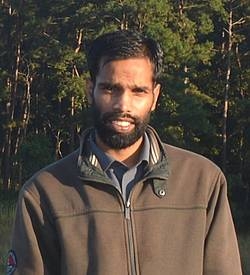Minette Nago, Cameroon
Minette Nago is the first candidate to start the IUFRO-EFI Young Scientists Initiative research visit. This brand new initiative is designed to provide a mobility grant for promising young scientists from Africa, Asia and Latin America. Each grant allows for a three-month short scientific visit to a European research institute.
Her project is titled "The politics of forest and climate change cooperation in Congo basin" and is currently being conducted at Goettingen University, Germany. The project has already yielded some success and will most likely produce a journal article titled "Forest diplomacy in the Congo basin: The failure machine?" This aims to contribute to the expansion of the IUFRO Division 9 - Forest Policy and Economics and is focused on diplomatically orientated forest negotiations.
When asked about her impression of the YSI thus far, Ms Nago responded, "It is very encouraging in terms of the support of the initiative administrative staff as well as the network built at the host institution." This is great news as it seems that the intended collaboration between institutions across the world is working seamlessly.
The next four grantees will start their visits shortly and we are looking forward to hosting them in Europe. We wish Ms Nago and her future YSI counterparts a successful and productive time in Europe
Prem Prakash Singh, India
Mr. Prem Prakash Singh is a Ph.D. student from North-Eastern Hill University, India. He is working under supervision of Dr. Somidh Saha (Karlsruhe Institute of Technology, main host) and Prof. Dr. Jürgen Bauhus (University of Freiburg, co-host) during his short scientific visit to Germany.
His research interests are in the fields of forest restoration, forest ecology, and biodiversity conservation. He is exploring the scope of future collaboration between Germany and India to restore degraded and fragmented forests of his state.
His project entitles Assessing restoration potential of fragmented and degraded Fagaceae forests in Meghalaya, North-East India. The forests in Meghalaya are highly degraded and fragmented due to high anthropogenic disturbances (e.g., mining, unsustainable forest utilization, shifting cultivation, browsing etc.). In this study, they are assessing for the first time, the restoration potential (i.e. capacity of natural regeneration and state of vitality) of Fagaceae species (2 Lithocarpus, 4 Castanopsis, and 4 Quercus species) in Meghalaya. The aim is to find out how biotic factors, abiotic factors, and anthropogenic disturbances influence restoration potential of Fagaceae species. Also, they aim to motivate tribal landowners towards forest landscape restoration and sustainable community forest management. He hopes the project will set the stage for creating future trials on forest restoration; combining passive (e.g. fostering the existing forest patches), and active restoration (e.g. planting degraded areas), with participation of local tribal communities and support from the government.

